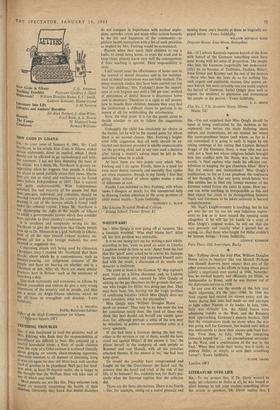T EETHING TROUBLES 8 „ I R , was fascinated to read the plaintive wail
of 'ars. Furlong who finds that the responsibilities of Parenthood are difficult to bear. She conjured up a fearful household scene; a flock of spoilt children after the style of a Giles cartoon is scattered liberally about gorging on sweets, chain-smoking cigarettes, obviously resistant to all manner of cleansing, lying in wait yet again for dear old Mum back with another load of goodies to be plundered. Well past her tired- ness peak, at least 90 degrees under, she is happy in the thought that the Welfare State will take care of any ill which may befall. , Most parents are not like this. They welcome facts "ased on research concerning the health of their children. Obviously they know that dental disorders
do not compare in importance with nuclear explo- sions, sputniks, crime and many other serious hazards to the life and happiness of the community—to preface health instruction with a list of such priorities as implied by Mrs. Furlong would be nonsensical.
Parents when they teach their children to use a knife, to avoid being burnt, to cross the road and to keep clean, already know very well the consequences if their teaching is ignored. Their responsibility is clear.
Until recent years the effectiveness of home care in , the control of dental disorders and in the mainten- ance of dental restorations was not fully realised. The many research studies that have been carried out (on 'real live children,' Mrs. Furlong]) show the import- ance of oral hygiene and until a 100 per cent. method of prevention of dental disease is discovered home care is necessary. Therefore it is right to tell parents how to benefit their children; because they may find the instructions a difficult chore to perform is no reason at all for withholding the information.
Now, the vital point. It is for the parent alone to decide whether or not to follow the suggestions offered.
Unhappily the child has absolutely no choice in the matter, yet he will be the injured party for whom there is no second chance. Mrs. Furlong's bright- eyed little suggestion that all teeth should be ex- tracted and dentures provided is wholly impracticable for the growing child, and in any case such a decision after taking a dentist's advice must be left to the individual when he is adult.
At least there are two points over which Mrs. Furlong and I do agree. Firstly, there is a need for even more dental research, and secondly that apples are often expensive; though in my family I find that giving slices instead of whole apples makes a deal of difference in cost.
Finally I am indebted to Mrs. Furlong, with whose views I disagree so much, for this unexpected help in drawing further attention to the acute problem of child dental health.—Yours faithfully,
GEOFFREY L. SLACK
The London Hospital Medical College, Dental School, Turner Street, El


































 Previous page
Previous page